Andrew Ottaway left Namibia in November 2019 feeling optimistic.
The specialist anaesthetist had been volunteering at a hospital in the town of Eenhana in the country’s north, training a doctor there to administer spinal anaesthetics.
“I felt that he didn’t quite get there and I wanted another visit on our part before I gave him the tip to start practising on his own,” the Hobart-based doctor said.
Serving a population of about 100,000 people, the Eenhana District Hospital is currently staffed by just five doctors and none of them are trained anaesthetists.
As a result, its operating theatre has been closed since 2016 and women in labour have been unable to access caesarean sections there, leaving some of them with no other choice but to seek health care as far as 90 minutes away.
While the anaesthetist-in-training hadn’t yet completed his apprenticeship under Dr Ottaway, the latter was confident he would be sufficiently upskilled by the end of his next trip to Namibia in five months’ time.
Then Covid-19 brought all of this to an abrupt halt. Due to border closures, Health Volunteers International (HVI), Dr Ottaway’s charity, hasn’t been back to Africa since late 2019.
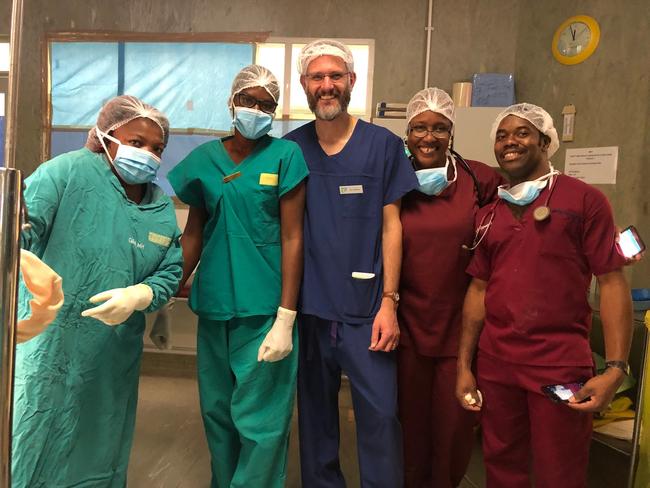
“If we’d had this guy trained up, he could have started delivering the spinal anaesthetics for the caesarean sections,” Dr Ottaway told TasWeekend. “The ripple effects are huge considering the pandemic has kept us away for three years.”
Dr Ottaway said up to 200 women may have died in that space of time simply because of the hospital’s lack of an anaesthetist.
“If they have a woman who needs an urgent caesarean section, they get chucked in the back of an ambulance and sent anywhere from 45 minutes to an hour-and-a-half down the road to the nearest hospital that can give an anaesthetic,” he said.
“And obviously the babies are usually dead and often the mothers are dead when they arrive.
“Small changes … can make a big difference in terms of not just quality of care but actually the big picture stuff of saving mothers and babies from dying.
“It’s really quite heartbreaking, actually.”
Now, HVI is preparing to make its long-awaited return to Namibia this November, with one of the priorities being to get the Eenhana District Hospital’s operating theatre up-and-running once more.
Dr Ottaway, who runs a private practice on Macquarie St and works part-time as a staff specialist at the Royal Hobart Hospital, founded HVI in 2017, aiming to improve the quality of health care, particularly maternal and child health care, in low and middle income countries.
Namibia, bordered by Angola in the north and South Africa in the south, was selected as the initial base for HVI’s work due to it being an English-speaking nation, politically stable and relatively safe for travellers.
According to data from the World Bank, Namibia’s maternal mortality ratio was estimated to be 195 deaths per 100,000 live births as at 2017, ranking it in the bottom 50 nations in the world.

Dr Ottaway hopes that HVI can once again start sending teams of 12-14 volunteers – consisting of anaesthetists, obstetricians, theatre nurses, midwives, and other specialists – over to Namibia for two weeks at a time, multiple times a year.
A humble man who shies away from the spotlight, Dr Ottaway, who has a Master of Public Health degree from the Harvard T.H. Chan School of Public Health, was hesitant about appearing in a photo by himself for this story.
He asked if some of the other volunteers travelling with him to Namibia could be included in the photo shoot. After I explained to him that we preferred to have a single subject in the TasWeekend cover shot, he reluctantly acquiesced.
To Dr Ottaway, the work of HVI is about much more than just one man. It’s a true team effort, driven by the goodwill of dedicated health professionals who believe unwaveringly in equality of health care.
In Namibia, HVI’s volunteer teams seek to address the lack of knowledge, training and resources available to the local medical workforce. The volunteers base themselves at Oshakati Intermediate Hospital, which is the largest hospital in the country outside the capital city of Windhoek.
From Oshakati, the teams undertake outreach work to smaller hospitals at Eenhana and Engela. All three hospitals are in the country’s north, where about 75 per cent of its 2.5m-strong population resides.
“We’re dealing with, at an educational level, doctors who have the best of intentions but usually zero formal training,” Dr Ottaway said.
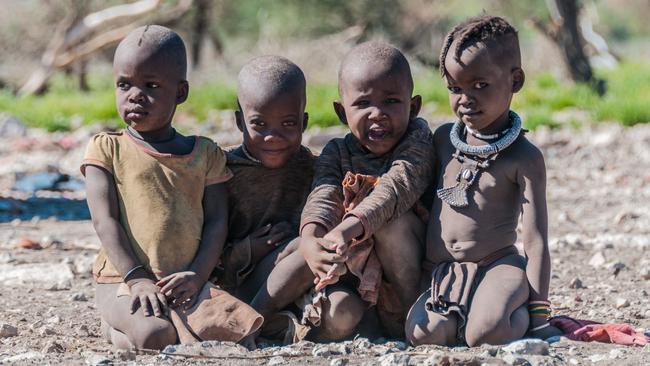
Even at Oshakati, there is just one specialist doctor trained in anaesthetics and intensive care. At the district hospitals, there are none.
“The obstetric and gynaecology department (at Oshakati), on our last visit, they had one doctor who was a trained gynaecologist,” Dr Ottaway said.
“They were delivering 6000-8000 babies a year and the head of the department had been a medical intern – she’d been graduated for three years and had no formal training at all.
“She was just relying on what she saw at work every day and then she’d go home and read the text books. She was self-teaching.”
Part of the problem is that the University of Namibia has only just recently started training medical students; before that, Dr Ottaway said, the Namibian government would send aspiring doctors to receive their training abroad in either Russia, China, or Cuba.
According to Dr Ottaway, this system tended to produce “doctors, in inverted commas”.
“It was well-known doctors who came back from China would come back … having never touched a patient,” he said.
“We are working with the (University of Namibia) to try to support their training program. We help with the theory, with delivering some lectures, with marking of exams and theses and all that kind of stuff.”
Rachel Earl, a specialist obstetrician and gynaecologist who was part of an HVI team that travelled to Namibia in September 2019, said she believed the charity’s work would “make a difference beyond the couple of weeks a few times a year” that teams were dispatched there.
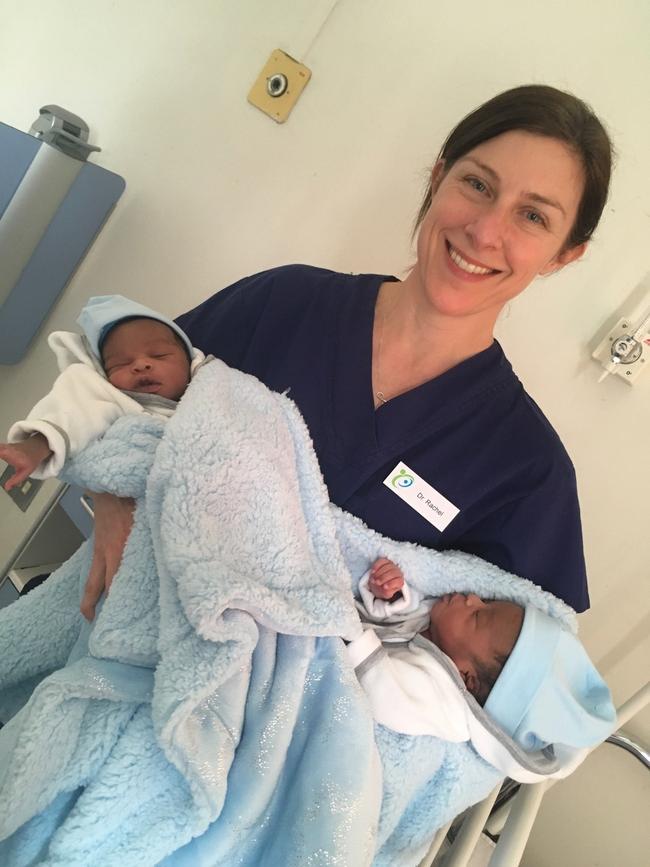
“I think the groundwork has been done, which is good,” Dr Earl said. “And I think now that we can travel, coming with that frequency will mean that some meaningful change can be achieved.”
“If you can provide (people) with education, they can then pass it on to the doctors they’re training and it actually becomes something that makes a broader difference.”
Dr Ottaway agreed.
“We’re trying to help improve the quality of the teaching so that over time we can help build that critical mass of trained and knowledgeable practitioners that can then train the next generation,” he said.
Dr Earl, who works at the Women’s and Children’s Hospital in Adelaide, is returning to Namibia with Dr Ottaway and other volunteers in November this year.
“I’ve always sort of felt that it’s kind of an accident of chance and birth that we’re in the situation that we are (in Australia),” she said. “So it’s not like we’re more deserving of having good health care or anything else that goes with where we are than anyone else.”
“Everyone deserves equal health care no matter where they are.
“I really believe in that.”
Making the decision to join one of HVI’s teams is not a straightforward one, with volunteers having to pay for their own flights and accommodation, equalling a total of about $2000.
Dr Ottaway said the charity paid for work visas, temporary medical registration, hire cars and petrol costs, amounting to roughly $7000 per team.
HVI is holding a fundraising event ahead of Mother’s Day at The Deck at Crowne Plaza on Friday, May 6, hoping to generate support for its upcoming trip.
Dr Ottaway said: “Part of the dream, if we get big enough, would be to then, through our fundraising activities, have enough money that we can … start subsidising the costs of the flights and the accommodation for the nurses in our teams because obviously … (this) is a bigger hit to them than it is for specialist doctors who have bigger incomes and can afford it a little bit more.”
Among the 12 people venturing to Namibia in November will be first-time HVI volunteer Robyn Withers, a midwife at the Hobart Private Hospital who also teaches obstetrics to third-year medicine students at the University of Tasmania.
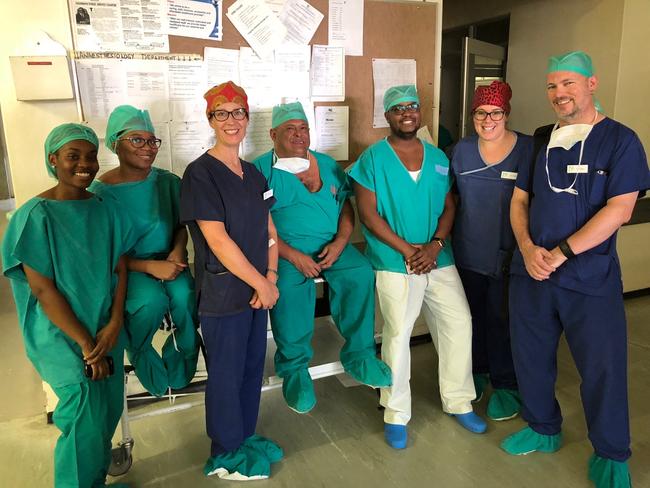
“I’m working lots of extra shifts, overtime if I can manage to fit it in between two jobs, with a focus on having enough money to make that trip,” she said.
“I live a really comfortable life. I don’t go without very much.
“So I don’t think it’s a big sacrifice. After over 35 years of midwifery, I think it’s time to give something back.”
Ms Withers was meant to go to Namibia with Dr Ottaway in March 2020, before the pandemic forced them to cancel their trip.
“One of the anaesthetists that I’m friends with who went (to Namibia) a few years ago, she said, ‘Just keep your expectations low’,” Ms Withers said. “And I felt really sad about that. I thought, ‘Wow, what am I going to see? What am I going to be exposed to?’”
“Even though we have our own level of stress (at the Hobart Private Hospital), we work in a very well-functioning, cohesive team, where all risks are managed, women get very good care.
“Those women walk in the door and expect to have a good birth and go home with a baby. And I wouldn’t expect anything else in our modern day hospital system.
“And there isn’t that expectation, from what I’m reading, in this area of Africa.”
Ms Withers said she wasn’t sure how much she could achieve in Namibia in the space of two weeks but she hoped there would be “something I could offer”.
“I’m just going to tip-toe in there and very quietly see what’s going on and then see whether there’s areas where we can help them,” she said.
“I’m going in with an open mind and hoping that we can maybe establish relationships and make small changes and work towards going back again and just keep chipping away to improve things for them and support them.”
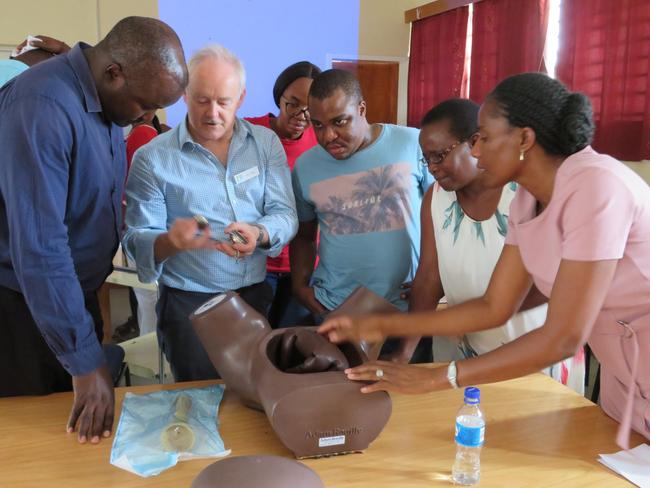
With his trademark modesty, Dr Ottaway says he doesn’t like to “beat our own drum too much” but that HVI is having an impact on the quality of health care being delivered in Namibia.
However, the process is a “slow burn”, he said.
“You need to develop these relationships slowly and carefully before they will start to trust you and start to listen to you and then start to change their practice,” Dr Ottaway said.
“I’m really hopeful that when we get this team (to Namibia) in November, that I’ll be able to finish training this medical officer … that we can get him delivering spinal anaesthetics, reopen that operating theatre (at Eenhana District Hospital) and then start seeing actual lives saved.”
“That’s what gets me excited – that potential to be making such a big difference there.
“I know we’re getting very close to that.”
To donate to HVI, visit healthvolunteers.org/donate.

Add your comment to this story
To join the conversation, please log in. Don't have an account? Register
Join the conversation, you are commenting as Logout
Tight Senate race continues for Tassie spots
For some the federal election is done and dusted but the race for a Senate spot is heating up. Read the latest.
How you can claim $100 tourism vouchers this winter
A new $10m tourism and hospitality voucher scheme has been announced for Tasmania ahead of winter. HOW YOU CAN GET YOUR HANDS ON $100 VOUCHERS >>>